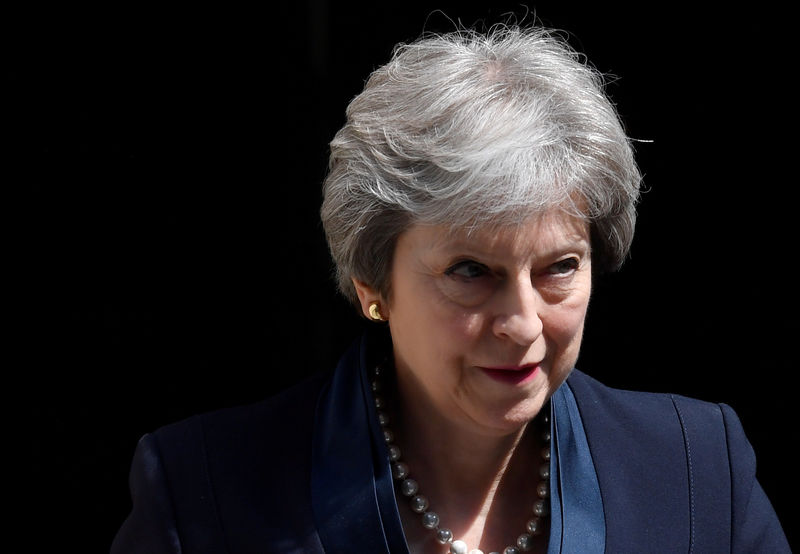 © Reuters. FILE PHOTO: Britain’s Prime Minister Theresa May leaves 10 Downing Street in London
© Reuters. FILE PHOTO: Britain’s Prime Minister Theresa May leaves 10 Downing Street in LondonBy Gabriela Baczynska, Robert-Jan Bartunek and Andrew MacAskill
BRUSSELS/LONDON (Reuters) – A European industry lobby told Prime Minister Theresa May on Wednesday that Britain needed trade to be as “frictionless as with a customs union” after Brexit, adding to growing EU pressure on London over divorce negotiations that have stalled.
The EU is voicing increasing frustration with lack of progress in key areas of the Brexit negotiations, most notably on the Irish border, and dismisses Britain’s thinking on future cooperation from trade to security as unrealistic.
During the latest, inconclusive negotiating round last week, the EU was angered by London publicly threatening to go back on a deal on a financial settlement if the EU did not give it full access to the Galileo satellite navigation system after Brexit.
That came in as the two sides’ envoys sat in a room in Brussels trying to find a solution to their disagreement over the European version of the GPS.
In other disagreements, the EU has repeatedly ridiculed Britain’s plan to use top-notch technology for border checks – including customs – on the island of Ireland after Brexit.
The bloc says that would go nowhere close to the ultimate goal of avoiding re-erecting a “hard” frontier between EU state Ireland and Britain’s province of Northern Ireland, which both fear the border issue weighing on their still-fragile peace.
The European Round Table of Industrialists (ERT), which brings together around 50 firms from Germany’s energy giant E.ON (DE:) to the Dutch publisher Wolters Kluwer (AS:) to the British-Swedish pharma group AstraZeneca (L:), also issued a warning during their meeting with May.
“The uninterrupted flow of goods is essential to both the EU and UK economies. This must be frictionless as with a customs union. We need clarity and certainty, because time is running out. Uncertainty causes less investment,” the lobby said in a statement.
TRANSITION AT STAKE
May’s office issued a statement after the meeting saying the government stuck to its position that Britain should have its own trade policy with the rest of the world and frictionless trade with the EU. In addition, there should be no hard border with EU member Ireland, the statement said.
Embattled at home, May has so far failed to come up with a final version of what sort of future customs arrangement London would seek with the EU after Brexit.
May is locked between those seeking a clean cut and wanting to leave the EU’s customs union to pursue new trade deals elsewhere in the world, and those keen to keep Britain as close to the bloc as possible Brexit to limit disruptions to trade and peoples’ lives.
British manufacturers have added to the pressure on May by calling on the government to abandon one of its post-Brexit customs proposals, slamming the idea of a technology-based plan for border checks as naive and a waste of money.
Ahead of a late July summit when all 28 EU leaders, including May, had been expected to mark another milestone in the talks, the bloc’s Brexit negotiator Michel Barnier told London to stop playing “hide and seek” on Brexit.
On future security cooperation, the bloc has dismissed Britain’s demands to remain as hooked-in after Brexit, due next March, as currently. Another EU official involved in the talks stressed the bloc was running out of patience.
“If they wanted to break free, now would be the time to do it. Instead, they want to opt in to just about everything,” the person said. “They must realize they are in fact leaving the EU and that has logical consequences.”
“Rather than agreeing terms of their departure from the EU, the Brits are proposing to build a new union between the EU and the UK. In which the EU and the UK have equal say about everything, including EU matters,” the official said ironically.
While the EU’s mounting pressure on Britain could just be a negotiating tactics, the stakes are high.
Unless a final Brexit deal is agreed this autumn, leaving enough time for a complex EU ratification process before next March, London could lose a status-quo transition period it had been promised afterwards and until the end of 2020.
It is meant to let business and people affected prepare better before the new reality kicks in.
Without it, Britain would just crash out from one day to another with very little clarity on what regulates an elaborate network of its links to the bloc, from aviation to agriculture to aerospace cooperation.
“If the Brits don’t change their approach, there will be no more negotiations. It’ll just be a blame game from now on,” the official told Reuters.
Source: Investing.com


























